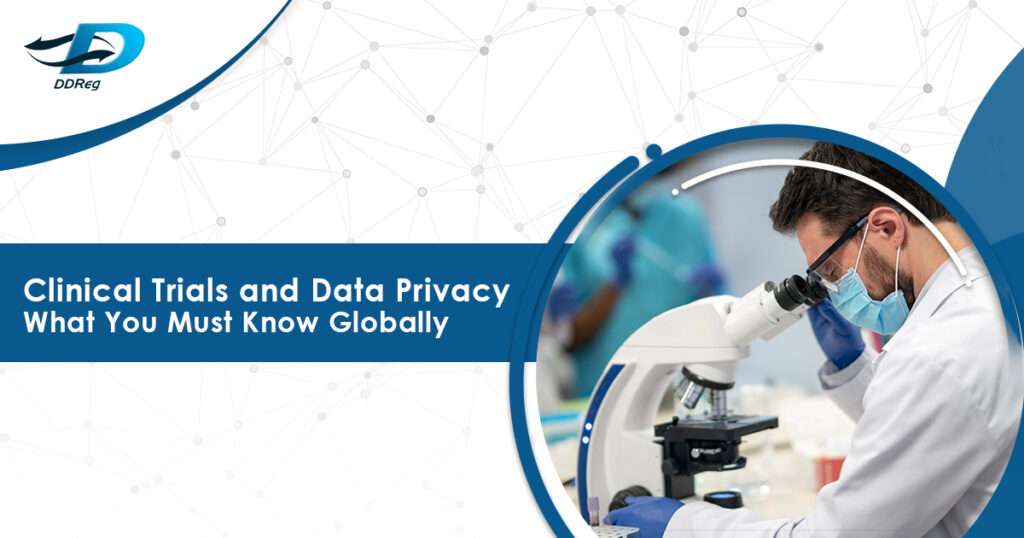
Imagine volunteering for a clinical trial sharing your medical history, personal habits, and even your genetic data, all for advancing science. Now imagine that data falling into the wrong hands. In an age where data is as valuable as the therapies being developed, data privacy in clinical trials has become a keystone of ethical research and global trust.
Clinical trials today span continents, enrolling participants from diverse regulatory environments. This global scope means sensitive data like health records and biospecimens is collected and shared across borders. A single lapse in data protection can result in serious consequences: compromised patient safety, regulatory penalties, halted research, and loss of public trust.
As global studies continue to rise, so too does the complexity of navigating a web of evolving data privacy laws. Let’s explore what sponsors, CROs, and regulators need to know to stay compliant, ethical, and secure in today’s clinical trial ecosystem.
Global Regulatory Frameworks for Data Privacy
Conducting clinical trials across borders means confronting a patchwork of data protection laws. While international frameworks like ICH GCP E6(R3) aim to harmonize ethical standards, the interpretation and enforcement of data privacy regulations differ widely.
European Union: GDPR as the Gold Standard
The General Data Protection Regulation (GDPR), enforced since May 2018, is widely regarded as the most stringent data privacy regulation globally. It applies extraterritorially, meaning any organization processing the personal data of EU residents must comply regardless of where the organization is based.
Key GDPR requirements in clinical trials include:
- Explicit, informed consent for data collection and processing.
- Participant rights to access, correct, and, in some cases, delete their data.
- Clear communication in consent forms about how personal data will be collected, shared, stored, and used over the study lifecycle.
A 2022 study revealed that following the implementation of the EU General Data Protection Regulation (GDPR) in 2018, the number of phase 1 and 2 trials increased in countries with comparatively less stringent data privacy frameworks, such as Turkey and Egypt. This shift highlights how regulatory environments influence where trials are conducted, underscoring the importance of understanding data privacy obligations in every region where clinical research is undertaken. These rights can create challenges for clinical trial sponsors who must balance long-term data retention needs for scientific integrity with individuals’ right to be forgotten.
United States: HIPAA and State-Level Complexities
In the U.S., the Health Insurance Portability and Accountability Act (HIPAA) governs the privacy of health information. In clinical research, HIPAA provides certain exemptions and allowances, including:
- Authorization waivers approved by Institutional Review Boards (IRBs).
- Use of de-identified data where personal identifiers are removed.
- Individual authorization for use/disclosure of protected health information (PHI).
However, complexities arise from state-level laws such as California’s Consumer Privacy Act (CCPA) and California Privacy Rights Act (CPRA). These introduce GDPR-like provisions, including:
- The right to know what data is collected.
- The right to delete personal information.
- Enhanced consent requirements.
Such overlapping frameworks can complicate compliance for multi-state and multinational trials.
Asia-Pacific: Evolving and Diverse Frameworks
The Asia-Pacific region features a mosaic of emerging and updated privacy laws:
- Singapore: The Personal Data Protection Act (PDPA) (Revised 2020) mandates consent prior to data collection and allows individuals to withdraw consent at any time.
- Japan: The Act on the Protection of Personal Information (APPI), most recently amended in April 2023, reinforces individual rights and introduces stronger penalties for non-compliance.
- China: The Personal Information Protection Law (PIPL), effective November 2021, enforces strict controls over cross-border data transfers. Trials involving Chinese participants must navigate complex approval processes for data sharing, potentially affecting study timelines and logistics.
Challenges in Global Clinical Trial Data Privacy
Regulatory Fragmentation
Each country’s regulatory framework can vary dramatically, making harmonized compliance difficult. For example, what is considered adequate consent under one regulation may not suffice under another.
Informed Consent Complexity
Clear and transparent communication with participants about how their data will be used is essential. Misunderstandings can foster distrust and reduce enrollment rates in clinical studies.
Cybersecurity Threats
Sensitive patient data could be a prime target for cyberattacks. Sponsors and research institutions must invest in robust cybersecurity measures and continuously monitor for vulnerabilities to protect participant information.
Human Error and Training Gaps
As privacy laws evolve, regular training for all stakeholders including clinical investigators, sponsors, CROs, and data handlers, is vital. Awareness and preparedness help organizations remain compliant and foster public trust.
Conclusion
While clinical trials are crucial for advancing healthcare, protecting the data privacy of participants is equally essential. By treating privacy as a fundamental human right rather than a box-checking compliance task, clinical research can uphold public trust and ethical integrity. Staying current with global data privacy developments is vital for successful clinical operations, particularly as regulations become more complex and interdependent.
The future of clinical trials depends not only on scientific innovation but also on a collective commitment to safeguarding the privacy and dignity of participants around the world.
How can DDReg help?
Leveraging deep subject matter expertise and an experience with over 120 regulatory authorities worldwide, DDReg is a trusted partner for regulatory, clinical regulatory services and pharmacovigilance solutions.
For further information, connect with our experts. Read more from the experts about Clinical Trial Information here: Navigating the New Requirements for Diversity in Clinical Trials
